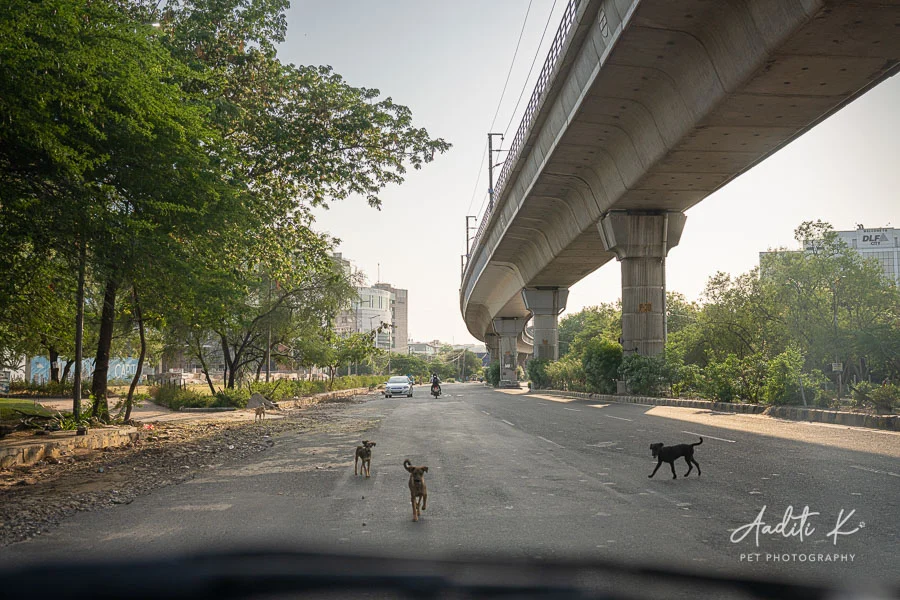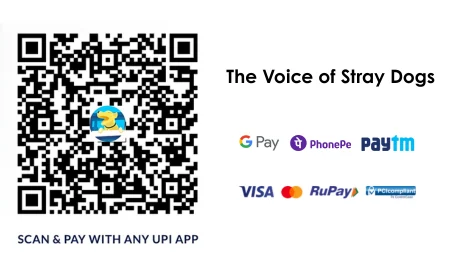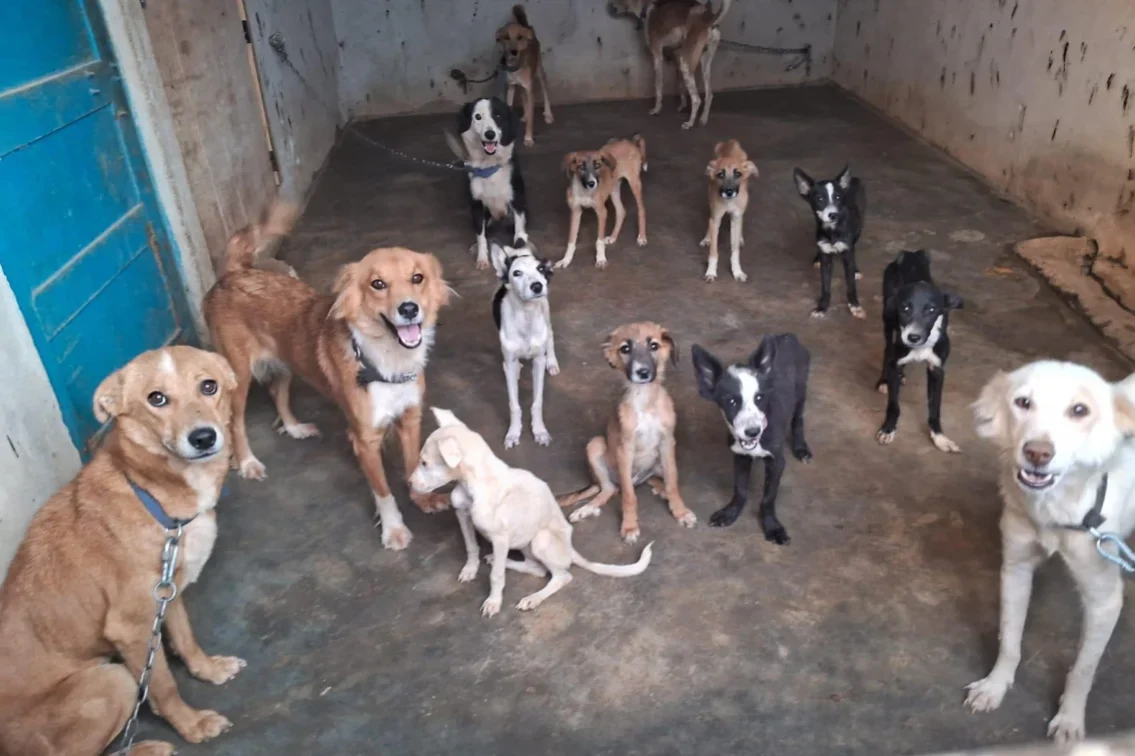A story of survival and empathy
On 24 March, 2020, the Government of India announced a 21 day nationwide lockdown, that was later extended until 3 May, 2020, as a preventive measure against the 2020 coronavirus pandemic in India. While as humans we had the privilege of being able to plan for our upcoming meals for the days to come, not everyone was as lucky. Most people reacted to the news by looking out for themselves and their needs, others stepped up to look out for the needs of those who couldn’t fend for themselves.
This photo essay explores the dire straits of India’s stray dogs during the COVID-19 lockdown and the unsung heroes who looked out for them.
LOCKDOWN, DAY 36



‘Love before hunger’ was a new perspective of life.

Over a month has gone by since Gurugram’s CGS Hospital dog feeders, complete a two hour journey twice a day, feeding over 250 dogs, tirelessly meal after meal after meal. While these dogs got lucky, there are others who have had to face 36 hard days of foraging for food that disappeared without warning.

Most people believe, ‘they are stray dogs, they’ll somehow find food’. The feeders however are silent heroes who have a much deeper insight into the plight of India’s stray dogs which is why they risk their own lives by stepping out during a pandemic, in order to save theirs.
THE CHALLENGE
According to a 2018 estimate, the population of stray dogs in India is around 30–35 million. For food, these dogs usually depend on street food vendors; scrounge around corporate office blocks; favour butcher shops; rely on restaurant food leftovers and pick through open garbage disposals. During the lockdown, all these sources of food are no longer available. This implies millions of stray dogs are now starving!

Secondly, being territorial animals, each pack of dogs usually stays within its own territory. However, when hungry, a dog that is able and fit to wander, will go outside its territory in search of food. This creates a two-fold problem i.e. either a human-animal conflict: if humans in the new area don’t want dogs there; and/or animal-animal conflict: strays in the other area would be facing food shortages too and will be aggressive and protective of their territory resulting in serious fights. The dogs that don’t leave their territory – specially the wounded or old dogs, would likely face starvation and die. Needless to add – this would create another health issue.

According to India’s Livestock Census-2012, there are about 5.28 million cattle in India. The current number is likely higher. This leads to an additional challenge of pigs; cows; cats; crows also vying for the same hand outs of food for survival as it’s important to remember that there is little or no food to be foraged on the streets during the lockdown.

There’s a pecking order on the streets and with food being so scarce, the ’survival of the fittest’ will prevail.
COVID19 WON’T KILL, LACK OF EMPATHY WILL
In India, misinformation on the Coronavirus spread faster than the disease. Among others, one casualty of this was the fear that crept into society that animals could be carriers of COVID19.
“Despite the World Health Organisation (WHO) clarifying that pet animals cannot spread or get COVID-19, many state governments had put out advisories cautioning against being close to animals. While some of the state governments took back their word and the animal welfare board of India (AWBI) issued an advisory, a panic was created,” said Alokparna Sengupta, Interim Managing Director for Humane Society International India.

Subsequently, human-animal conflicts increased: residents began harassing dog feeders and dog parents in societies; societies banned dogs and in some cases people and pet stores even resorted to abandoning the pets under their care. “Wrong messages are being sent which is not helping anyone’s case, especially the animals,” said Ganesh Nayak, founder of Mumbai-based NGO Animals Matter to Me.

Unknown to these dogs, COVID-19 had clearly impacted their lives too. However, it isn’t the virus that is the threat, it’s a lack of empathy from humans that could prove to be fatal to them.
NOT ALL HEROES WEAR CAPES

On 5 April 2020, citizens all across India showed solidarity with the health workers, police and those fighting COVID19. Unacknowledged at that scale, there are other silent heroes who are saving lives everyday without any recognition – feeders looking out for the lives of India’s stray dogs. In the absence of a Government initiative to feed strays, ordinary people and animal welfare organisations across India’s major cities have stepped up to make sure stray dogs are fed during the lockdown.
They come in all forms, housewives, college students, NGO’s, Hospitals, veterinarians, they walk the street at wee hours of the morning, night as well as the scorching mid day heat feeding hand-cooked meals at their own expense to hundreds of dogs at a time, diligently and quietly.

“Our team is now feeding over 1800 dogs and cats in Delhi and Noida along with 120 starving ponies caught in the city during lockdown. We are preparing over 750 kgs of cooked food together with prepackaged dog and cat foods and distributing them through different routes. Twice a week we provide feed and fodder to the hungry ponies and since yesterday we have begun distributing green fodder to the stray cattle in Gurgaon around our lifetime care sanctuary. As in any disaster feeding and helping the animals to survive is Friendicoes main concern”, said Geeta Seshamani, Vice President of Friendicoes.

“When animals are well looked after, they will stay calm and happy,” said Samir Bhatia, who feeds at least 200 strays in Mumbai’s Worli, Prabhadevi and Lower Parel neighbourhoods.
“There are a large number of people running feeders across the city. I can say that at least in Bengaluru, we won’t see the problem of street dog starvation,” said Animal activist, Nandini Singh.
NO BED OF ROSES

However, the on-ground support for feeders across India is not one without problems.
Despite circulars from BJP leader and animal rights activist Maneka Gandhi, Animal Welfare Board of India and even an appeal by Prime Minister Narendra Modi to feed animals in this time of crisis, animal feeders across the country are facing harassment.
New Delhi resident Shruti Banda took to Twitter to narrate how she was harassed by residents of her housing complex because she was feeding strays, “I was alone, feeding my dogs, and this man got the entire society down, I was abused, my family was. And rules were broken. Police was called.”
I was alone, feeding my dogs, and this man got the entire society down, I was abused, my family was. And rules were broken. Police was called. (Couldn’t post the entire video cause of the limit) @Manekagandhibjp @KDMCOfficial @PetaIndia @MumbaiPolice pic.twitter.com/clBska0oyI
— shruti banda (@shrutibanda18) March 25, 2020
Disruption in food supply chains also is adding to the problems of feeding strays. Eggs, chicken, packaged dog food is not easily available. A Kolkata based animal rescuer and feeder, Alexandra Gade, complained about the skyrocketing prices of chicken, “I am paying Rs 250 for what was Rs 150 for 1 kg chicken. We are running out of resources”.

Disruption in food supply chains also is adding to the problems of feeding strays. Eggs, chicken, packaged dog food is not easily available. A Kolkata based animal rescuer and feeder, Alexandra Gade, complained about the skyrocketing prices of chicken, “I am paying Rs 250 for what was Rs 150 for 1 kg chicken. We are running out of resources”.
WHY DO PEOPLE STILL FEED ANIMALS DESPITE THE ODDS
“He who feeds a hungry animal feeds his own soul” Charlie Chaplin had once aptly remarked. Despite the odds, there isn’t a more rewarding task, given the heaps of affection the stray dogs shower their feeders with.

A lot of today’s animal feeders have been doing this for years prior to the COVID-19 lockdown. For these feeders, the stray dogs they feed are like family. Each stray dog is given a name, fed daily and feeders often also tend to any medical needs such as injuries (if any) and regular vaccinations of the dogs as well. Over time, these dogs become known as ‘free-roaming pets’ and share a deep bond with their feeders.
The difference between people who feel for species beyond their own and those that struggle to be civil to their own, is the ‘humane’ element that resides in them. It comes from their heart. In todays world, no temple, no museum of art, or man made form can boast of this devotion and love that these unsung heroes give unconditionally!

YOU CAN MAKE A DIFFERENCE

BE SUPPORTIVE:
- If you are aware of stray dogs that require food during this lockdown, report them to the nearest Animal Welfare NGOs or feeders who could take on the responsibility of feeding them.
- You could financially assist NGOs or existing feeders by donating funds to them. You can support VOSD by donating to our Feed Stray Dogs campaign.
- If you already feed stray dogs and need support, you can apply for a VOSD Grant.
- You could foster animals from local pet shelters, thereby reducing the resource crunch that they are currently facing.
- You could donate required essentials such as masks, pet food and other necessities depending on what your local NGOs or local feeders require.
FEED STRAY DOGS:
- If you would like to step out during lockdown to feed the stray dogs around you, you need to check the rules with your local authorities since each city has different protocols. Feeding strays in your society would likely not be an issue if you follow all social distancing norms. If you need to travel/cross borders, you may require a pass that can be applied for at your local district DCP office.
- Recommended dog food varies, but rice khitchdi with chicken or boiled eggs is a good place to start.
- Follow a timely schedule when feeding so that the dogs know they can count on you for their food and won’t venture out. Once they start counting on you, remember to be regular otherwise the dogs will go hungry without an alternative source of food.
- If nothing else put out bowls of water everyday, as that will benefit the birds as well as the ground animals with the summer heat already here, street animals need this more and more.

Remember, heroes wear masks.
Don’t forget to adhere to all Government protocols when stepping out during lockdown.
- Wear a mask, gloves and maintain social distancing norms.
- When handling and caring for animals, basic hygiene measures should always be implemented. This includes hand washing after handling animals, their food, or supplies, as well as avoiding kissing, letting them lick or sharing food. More recommendations are available on the OIE website.

In a world where materialism has taken over humanity, stories of compassion from the streets of India are heartwarming and inspiring. It is by no means an easy feat to wake up at the crack of dawn to cook for and feed hundreds of dogs, simply because they are starving and don’t have anyone else. It requires even more dedication, to risk your own life and your family’s, during a pandemic as severe as COVID-19, day after day. Save for the warmth and gratitude from the dogs who are now saved from starvation, what else do these feeders gain? Then again, what more is there to gain?
Written by Aaditi Kulshreshtha for VOSD.





